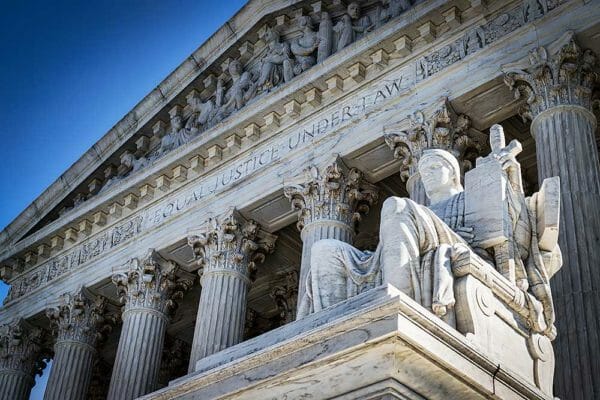
WASHINGTON, D.C. — The United States Supreme Court has granted certiorari in a federal case that could majorly curtail the power of federal agencies, like the Bureau of Alcohol, Tobacco, Firearms and Explosives (ATF), to make regulations.
The case, Loper Bright Enterprises v. Raimondo, was brought by a group of commercial fishing companies who challenged a rule issued by the National Marine Fisheries Service requiring them to pay for government observers that make sure that the companies comply with fishery management plans. The group is challenging the Fisheries Service rule claiming that Congress did not grant the Department of Commerce (the Fisheries Service’s parent agency) the power to enact such a rule.
National Marine Fisheries Service claims it used Chevron deference when making the rule. Chevron deference stems from the 1984 Supreme Court case, Chevron v. Natural Resources Defense Council. It states that the court defers to the responsible federal agency for the interpretation of a law when that law is ambiguous or unclear. The commercial fishing companies are asking SCOTUS to reconsider its ruling in Chevron. The Supreme Court agreed to hear the group’s case.
Although the fishing industry brought this case forward, it could affect firearms regulations since the ATF has liberally used Chevron deference in its gun regulations.
Without Chevron, it would be harder for President Joe Biden to use the Bureau’s rule-making power to make de facto law without going through Congress. Although eliminating Chevron’s deference isn’t a silver bullet, it will take away a tool that the ATF has used to defend its decisions to restrict gun rights.
The newest Justice, Ketanji Brown Jackson, has recused herself from the case, meaning that the other eight Justices will decide the lawsuit. This recusal doesn’t make the path to getting Chevron overturned any easier or harder. Justice Jackson never was expected to rule against Chevron deference, but it will still take five Justices to agree to get rid of legal precedent. Justice Clarence Thomas and Neil Gorsuch have been biting at the bit to rule on Chevron, but where the other Justices stand is a mixed bag. The court could have gone further to curtail Chevron deference in West Virginia v. EPA but chose to apply a very narrow decision, meaning we could see a similar narrow opinion.
Although nothing is for sure, the possibility of taking away a tool the ATF has used to defend its rulings has excited gun rights organizations that have seen the ATF hide behind Chevron deference in the past. The Second Amendment Foundation’s (SAF) founder, Alan Gottlieb, is hopeful that SCOTUS will reverse course and rule against the National Marine Fisheries Service.
“The Chevron doctrine has been used by lower courts as a tool to give bureaucratic and unaccountable administrative agencies like BATFE excessive deference in interpreting statutes that can affect the rights of gun owners,” said Gottlieb. “I think the Supreme Court has seen that the Chevron deference has proven corrosive to the American system of checks and balances and has directly contributed to an unaccountable executive branch, overbearing bureaucracy, and runaway regulation of firearms and will overturn it.”
Another gun rights organization that is hopeful that the Supreme Court will shackle the Executive branch from using Chevron deference is Gun Owners of America (GOA). GOA’s Senior Vice President, Erich Pratt, believes that the death of Chevron would help protect the rights of gun owners and firearm dealers.
“The Constitution demands that ‘all legislative powers’ shall be vested in the Congress, not in rogue administrative agencies like the ATF,” Pratt told AmmoLand News. “Americans have had enough of the Bureau’s unconstitutional gun bans, the most recent one affecting up to 40 million pistols; enough of the illegal gun running into Mexico via Fast & Furious; and enough of the maniacal Zero Tolerance Policy that has ended the livelihoods of honest gun dealers. GOA hopes the Supreme Court gives Chevron deference the death it deserves to better secure the rights of law-abiding gun owners.”
Although SCOTUS will hear the case, an opinion is still at least a year away.
About John Crump
John is a NRA instructor and a constitutional activist. John has written about firearms, interviewed people of all walks of life, and on the Constitution. John lives in Northern Virginia with his wife and sons and can be followed on Twitter at @crumpyss, or at www.crumpy.com.

from https://ift.tt/T9bYSZs
via IFTTT

No comments:
Post a Comment